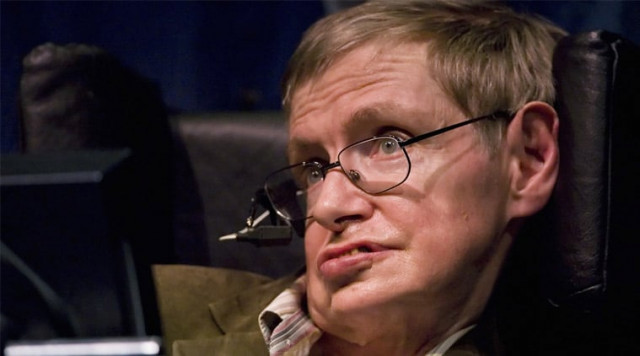Humans only have 100 years to colonise another planet for survival: Stephen Hawking
Physicist says mankind is running out of time

Theoretical Physicist Stephen Hawking.
PHOTO: REUTERS
The legendary scientist is making a new documentary ‘Expedition New Earth’ with the BBC as part of the new season of Tomorrow’s World. Hawking aims to explain to the world how mankind is running out of time and for their survival they will have to venture out in outer space.
In the awaited new series, Professor Hawking and his former student Christophe Galfard will travel the world to find out ways humans have to live in space.
Technological advancements may destroy human race, warns Stephen Hawking
BBC's Tomorrow’s World show was suspended after being on air for 34 years. It is now starting again after some 14 years and the producers have promised that this time the series will be way more impressive than it was in the past.
Professor Brian Cox, the TV presenter who is part of the series, said: “The original Tomorrow’s World inspired a generation – it certainly inspired me back in the 1970s, but that was a single TV programme.
“The 21st century Tomorrow’s World represents so much more – it represents the institutions of Britain coming together to inspire current and future generations, to convince them to embrace the opportunities that science brings, to foster a spirit of curiosity and tolerance, and to embrace the unknown not in fear but in wonder.”
Astronomers piece together first image of black hole
The broadcasting service has also taken on board some of the finest scientists associated with Royal Society, Open University, London’s Science Museum and the Wellcome Trust, to "connect audiences with the brightest minds and institutions in science and technology".
“We’ve come together behind a simple, and very bold ambition - to equip all of us with the knowledge and understanding we need to make sense of our lives and the future,” said Tony Hall, director-general of the BBC.
“Whether it’s the rise of robotics or the demise of antibiotics, travelling to Mars or the arrival of 3D printed food, science is changing the world at an extraordinary pace.”
The article originally appeared on The Telegraph.





1725099588-0/BeFunky-(41)1725099588-0-208x130.webp)













COMMENTS
Comments are moderated and generally will be posted if they are on-topic and not abusive.
For more information, please see our Comments FAQ